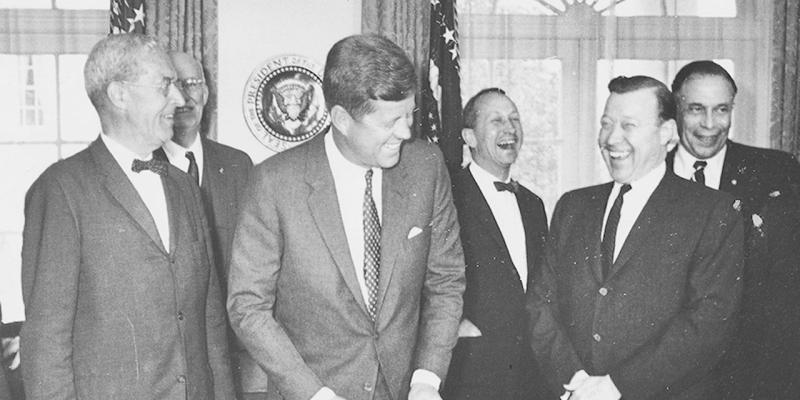'Norman Cousins' Review: A Man of Caution
By: Marc Weingarten (WSJ)



In these fractious times, consider the conciliator. During the Cold War, a respected, well-connected political outsider could drop into the middle of a fraught conflict between the U.S. and the Soviet Union and clear the air with a dose of ingratiation and judicious nudging. Though it might seem unlikely today, an American magazine editor, Norman Cousins, was among the most influential of these citizen-diplomats.
The editor in chief of Saturday Review magazine from 1942 to 1972, Cousins was an antinuclear firebrand, a gray-flannel idealist whose idee fixe was preventing global atomic annihilation at all costs. His editorials were studied by the power elite; his diplomatic overtures on behalf of a nuclear-free world, Allen Pietrobon argues, helped bring the two superpowers to the negotiating table during the Kennedy administration. Cousins is a faint footnote now, but Mr. Pietrobon, a professor at Trinity Washington University, has meticulously pieced together a revealing narrative, placing Cousins front and center in some of the most contentious international nuclear crises of the 1950s and '60s.
Born to Russian-Jewish parents in New Jersey, Cousins briefly attended Teachers College at Columbia University, working at several newspapers and magazines before joining the Saturday Review in 1940. During World War II, he also worked for the Office of War Information, editing pro-U.S. propaganda flyers that were airdropped onto European battlefields. When the U.S. detonated an atomic bomb over the Japanese city of Hiroshima on Aug. 6, 1945, Cousins’s worldview irrevocably shifted. It was the flashpoint that fired his life and thought until his death in 1990.
Cousins was horrified by the bomb. What had been touted by President Truman as the end of hostilities with Japan was for Cousins an attack on humanity. Twelve days after the bomb was dropped, Cousins published an editorial called “Modern Man Is Obsolete,” in which he noted “the violent death of one stage in man’s history and the beginning of another,” observing that “the science of warfare has reached the point where it threatens the planet itself”—a wildly unpopular view when 85% of Americans supported the decision to drop the bomb.
Regardless, Cousins stayed on-message, writing a series of impassioned editorials favoring a foreign policy that shored up our humane support for Hiroshima bomb victims instead of ignoring them. In one editorial, he floated the idea of a “Moral Adoptions” plan in which the federal government would provide support for war orphans in Japan. The idea didn’t take, but Cousins was just getting started.
Cousins was that rare creature, a political pundit who understood that words changed nothing unless backed up by initiative. He shepherded a plan to fly 25 women from Hiroshima to the U.S. to receive restorative cosmetic surgery. The attention accorded Cousins’s “Hiroshima Maidens” triggered a surge in demand for medical assistance in Japan; according to Mr. Pietrobon, 15,000 Japanese citizens applied for similar treatment. In 1957 Japan passed a law providing lifetime treatment for atomic bomb victims. It came to be known as the “Norman Cousins Law.”
As the circulation of the Saturday Review grew, so did Cousins’s political influence. At a time when the U.S. and the U.S.S.R. were proceeding headlong with underground nuclear testing, Cousins in 1956 published a lengthy editorial called “Think of a Man,” in which he pondered the erasure of the natural world via radioactive fallout. “How much more radioactivity can be pumped into the upper atmosphere,” Cousins wrote, “before the fallout . . . becomes menacing to life?” President Eisenhower read the piece and wrote to Cousins that “I am going to circulate [your article] among some of my close associates here.” Eisenhower may have passed the article around, but the tests continued.
Cousins found a more companionable ally in President Kennedy, who frequently leaned on him for counsel on nuclear policy and even recruited Cousins as a speechwriter. When U-2 spy planes spotted Soviet missile installations in Cuba in October 1962 and nuclear war appeared imminent, Cousins found himself at the right place at the right time—his own Dartmouth Conference, an annual meeting at which Cousins gathered scientists, religious leaders and politicians from both countries to discuss global disarmament. Tapping into contacts there, Cousins spoke with an attendee who had ties to the Vatican, then reached out to the White House for diplomatic cover. Together they gently prodded Pope John XXIII to draft a statement calling for “heads of state not to remain insensitive to the cry of humanity.”
Mr. Pietrobon credits Cousins, who had become “the personal liaison to three of the most powerful men in the world,” as a key conciliatory presence during the Cuban Missile Crisis, doing his part to ease the two nuclear powers away from the brink of mutually assured destruction or worse. When Cousins met with Khrushchev soon after, the Soviet premier, according to Cousins’s personal account, “volunteered the remark that Pope John’s appeal during the missile crisis had carried considerable weight in his thinking.” With Khrushchev taking his calls, Cousins did what he could to help smooth the way for the first Partial Nuclear Test Ban Treaty between the U.S. and the U.S.S.R. in 1963.
Granted, Cousins was a savvy disseminator of his own ideas. Mr. Pietrobon notes his gift for self-promotion, how the ink had hardly dried before he sent copies of his editorials to various government officials. Still, it’s a testament to Cousins’s rhetorical skill that his ideas found traction in Washington. Such soft power as Cousins wielded, a delicate dance of reconciliation that alerted the world to the threat of a global nuclear conflict, seems to be in short supply today. Perhaps our global leaders are less hospitable than they once were to earnest humanitarian overtures from concerned citizens. Or perhaps it’s because the world produced one Norman Cousins. This eye-opening biography is a primer for the lost art of gentle statecraft

Who is online
36 visitors

